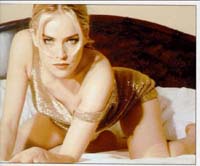Sharon Stone loses her 'Basic Instinct' as sequel disappoints
Fourteen years ago Basic Instinct blew all other contemporary films out of the water. Dutch director Paul Verhoeven, who had become famous in America through his brutal and intelligent fantasy thrillers Robocop and Total Recall, decided to bring the classical thriller in the spirit of Hitchcock dramatically into line with the demands of the time. The story about a police inspector with a tough character who set about investigating a brutal murder and subsequently fell under the bewitching spell of the main suspect recalled many Hitchcock movies (especiallyVertigo which it drew upon in both its atmosphere and purely visual techniques), but it was narrated in a wholly original way. Where Hitchcock limited himself to allusions to Freud, admittedly unequivocal ones, Verhoeven went the whole way. So an entirely new genre was born, that of the “erotic thriller”, which eventually dwindled away until nothing was heard of it, living out its days in the ghetto of low-budget movies with the obligatory use of words like “fatal”, “passion” and “seduction” in the title. There is nothing surprising about that: the ground-breaking film proved to be so powerful and self-contained that any repeat looked abject and derivative.

And the main thing is that in all these other films, there was no Sharon Stone. If the character she created, that of the writer Catherine Trammell who is consumed by a thirst for danger and does not give a damn about other people’s lives, can be compared with anything, then it can only be with the classic femmes fatales of 1940’s ‘films noirs’. Who, it must be said, however fatal they may have been, would never have dared to turn up to an interrogation at the police station without underwear on. The interrogation scene in Basic Instinct, when Stone crosses and uncrosses her legs, letting the policemen be convinced for a fraction of a second that she really has got nothing on under her dress, became a landmark for cinema in the 90s – just as much of a symbol as the “rabid dogs” bent over one another in Tarantino’s film, or the piano stuck in the sand in Jane Campion’s masterpiece. And not just for the 90s – respected experts named this scene “the most effective cinematic device since the time when the Red Sea parted in front of Charlton Heston in The Ten Commandments”. It is truly difficult to call to mind such a combination of danger and desire in one figure on screen.
Basic Instinct took more than 300 million dollars at box-offices worldwide, made Sharon Stone into a star, and naturally in due course someone came up with the idea of making a sequel. Yet by the time the dreams of a second part began to be realized, practically no one involved in the original was left: for the second version totally different people were forced to run this same gauntlet (in particular, it was the solid tradesman Michael Caton-Jones who took over from the visionary Verhoeven in the director’s seat – they had even seriously looked into the possibility of luring David Cronenburg into the role). Essentially only Sharon Stone remains from the original Instinct. Unfortunately,in these intervening years her fatal charms have regrettably dissipated, and instead of sailing down a roaring river, the film’s creators at best plopped into a bubble-bath.
At first it all seems to be not too bad: not three minutes in the car driven by Catherine Trammell races across the screen with breakneck speed, in which the driver and her drug-hazed footballer-boyfriend are indulging in carnal pleasures. At the height of their ecstasy the car ploughs through a barrier and plummets into the Thames (the action has been relocated from San Francisco to London). Catherine manages to escape, but her boyfriend drowns along with the car. In order to determine the extent of Trammell’s guilt in what happened, she is sent to be evaluated by successful psychiatrist Dr. Michael Glass (David Morrissey) who passes the following verdict: Trammell is dangerous, first and foremost to herself. Nevertheless, the extreme author is released fairly soon after. And the first thing she does is set off to find Glass, wanting to become his patient. And that is where things really start…
Or, to be accurate, that is where it all ends, because the subsequent action, alas, is incapable of arousing even the slightest reaction, apart from a few bewildered giggles at the start, which later turn into plain roars of laughter. The second Instinct seems like a fairly clunky parody. The intrigue which seems relatively strong at the start unravels before our very eyes, some characters just disappear for no reason at all, having not influenced the action in any way, the riddles remain unanswered, not because they are especially complex, but rather that nobody is interested in solving them. But this is not all, as the actor playing Glass is lacking in any sort of charisma, and in the sex scenes reminds you not so much of his predecessor Michael Douglas, but of Jean-Claude Van Damme, who in his time has become the undoubted winner of the most ridiculous facial expression ever to have been made during a sex scene. And even Sharon Stone also puts herself to shame.
After the alterations made by the censors which the film incurred before its release, the whole undertaking has lost all meaning whatsoever. All the sex scenes have been reduced to almost a minimum fit for TV (which incidentally aroused the legitimate indignation of Stone, who asked why she should bother to extend herself if the most effective sequences were going to be cut anyway), which is just inexplicable: after all, Basic Instinct is by definition not a film for family viewing. Some worthy detective intrigue could at least partly have made up for the film’s modesty, but this is a failure too – the finale seems to have been pasted in from a wholly different form of cinema, indeed a very poor form to boot.
Therefore all instincts turned out to be unfounded, and somehow off-centre. The infamous ice-pick does appear briefly on screen, but is never used this time around. The silver jewel that was the original Instinct has somehow melted away all by itself, leaving behind nothing more than a transparent tasteless puddle bearing no resemblance to its sparkling predecessor.
Stanislav Rostotskiy for Vremya
Translated by James Platt
Subscribe to Pravda.Ru Telegram channel, Facebook, RSS!





